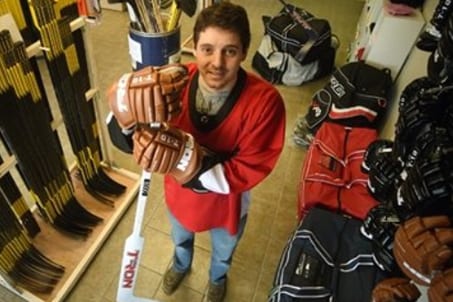
Describe your role at HockeyTron Canada.
I run the Canadian distribution of the Tron brand of hockey equipment. Right now I’m the only (official) employee, so it means everything from building and creating the brand to managing inventory to answering customer emails to packing boxes.
What’s the best part of your job? What’s the most challenging part?
The best part is uncovering new gaps in the market. Hockey retail is, in many ways, behind the times. The more we dig, the more we find massive improvements to be made. The latest example of this is the launch of our jersey ordering system, JerseysMadeEasy.com.
The most challenging part right now is working largely alone. I have lots of people I bounce ideas off, but none with deep enough contextual knowledge to poke serious holes in my thinking. I miss getting grilled by Mark, Sam and Eric!
What’s the best advice you’ve been given?
I used to hate hearing this because it sounded like generic advice, but persistence. I hear it from tons of people every day. Running an ecommerce company you get seduced by stories of overnight success. What I’ve come to realize is that many of those are an illusion because they fall into one of two categories:
- The dramatic rise was more of a “fad” and turned out to be completely unsustainable.
- The dramatic rise was a result of 1-3 (or more) years of really hard foundational work.
Building a brand requires building trust. Building trust requires a number of data points in people’s minds. To build something sustainable it requires consistent fulfillment of your promises day after day as opposed to one dramatic wave of a wand.
What’s something non work related that you do that has contributed to your success?
Meditation. Mark introduced me to it late in my time at SATOV. I’ve done a lot of reading on it and practice roughly 10 minutes each morning about 5 days a week. It’s really helped me manage repetitive thoughts and focus my energy.
You were a customer research expert at SATOV, how did this expertise help as you started your own business?
Basically every time I interact with a customer I think about all of the principles of customer research we used at SATOV. I treat every customer interaction both as an opportunity to create a brand advocate and an opportunity to collect data points.
My customer interactions are extremely deliberate. First, I try to solve the problem from scratch instead of deferring to industry norms, which usually leads to better answers and ecstatic customers. Second, I listen very closely as to how customers think about their purchase. I’m constantly updating product descriptions and making other site tweaks to proactively answer these questions in the future.
Mark still says you were the best case interview he’s ever had, how did you prepare for that interview?
You’re setting me up to sound cocky, because the answer is I didn’t do anything to specifically prepare for case interviews (actually, I didn’t even know people gave cases for interviews). I didn’t know anything about management consulting either. I applied to a job posting that looked (and turned out to be) more interesting than all the others.
Did I never tell anyone this while I worked there?
What do you think is the biggest challenge facing startups in retail?
I’m going to answer this question more specifically and talk about hockey retail in particular. I’m not sure if this is the biggest issue, but the fact many hockey players have been conditioned to believe they can get everything completely customized for little or no extra charge or wait is a huge pain point.
Every day you get customers that just expect you to have jerseys that haven’t existed since the 80s, gloves to match their rainbow colour scheme, and sticks in a curve only 1{a23d3e3aff46d689b50c88cc1d7606a7a28ed4b695b585c6bb0ea43784184748} of people use. The lead time on these products is extremely long, models are constantly changing, and you can’t carry every conceivable product combination just to not lose a sale. Unfortunately, customers have been offered so much choice that they’ll look for ages, convinced they’ll find exactly what they’re looking for despite no one in their right mind carrying it.
What did you learn at SATOV that you’ve applied at HockeyTron Canada?
Too much to fit it all here. Two major things that come to mind are thorough notes and a constant work-in-progress picture of what the problem and the solution are. I have this giant painting in my mind of what the hockey market looks like and I absorb every piece of information I can get my hands on to continue to fill the gaps.
What is your personal competitive advantage?
If I had to say it would be genuine enthusiasm. I mentioned before that I’ve found persistence is important, but it’s impossible to persist if you’re faking your interest. Being genuinely excited allows you to keep much more gas in the tank.
When you were a kid, what did you want to be when you grew up?
Like many, I wanted to be a pro hockey player. In hindsight, I wouldn’t be even if I could. I find many athletes hit the peak of their life extremely early, then sort of cling to it for their remaining decades. I want to still feel like I’m on the climb well beyond my 20s and 30s.
Leafs or Canadiens?
I grew up a Leafs fan, but in the past year I’ve actually grown to hate pro sports (yes, ironic for someone who owns a sports store). Basically, I’d rather be playing sports than watching sports. The idea of being a fan doesn’t appeal to me anymore.
